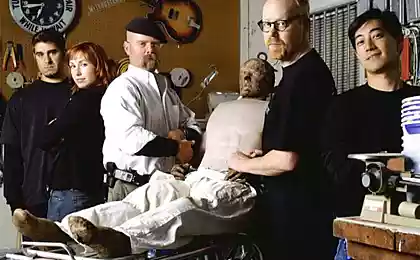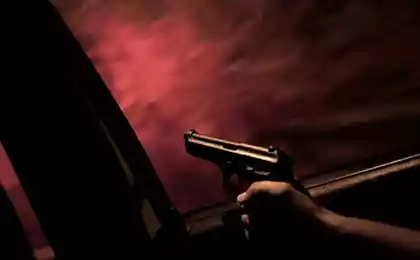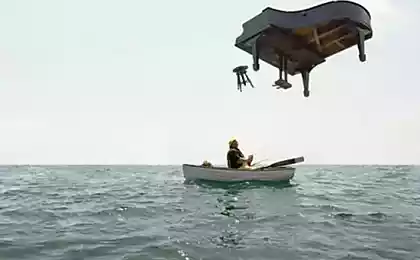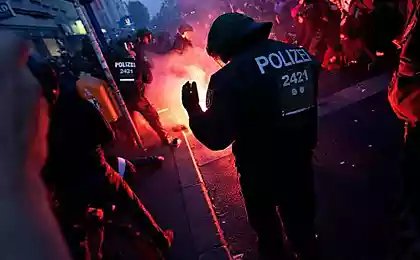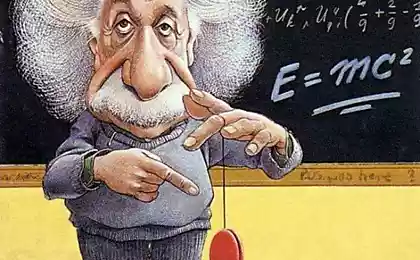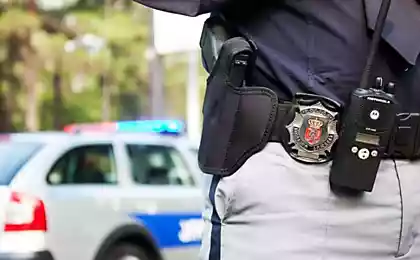1249
Two popular myth of the American police
When watching western movies and then we try to feed naive nonsense and myths sacrificing realism. Some of the concerns of the American police. There are two quite popular Hollywood myth of the American police, which can be quite useful for the citizens of Ukraine and Russia. It is about them, and I will tell you today. For the most part, these myths are quite harmless: for example the scenario in a police unit run by former husband and wife or unmarried couple.
In fact, this is not possible and not allowed across America - is that it not only undermines the discipline in the police force, but also a danger in a critical situation when one of the partners will not be able to act like a professional.
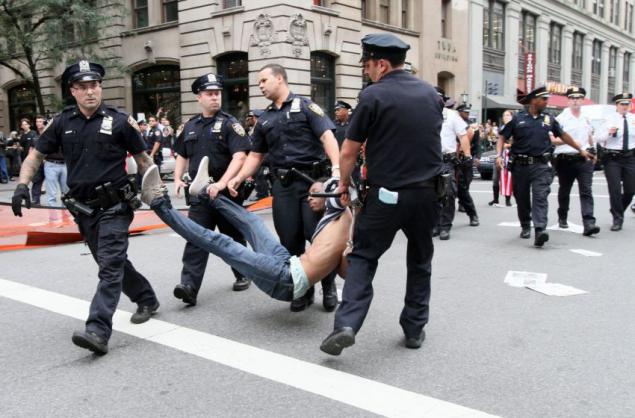
Or detective transferred from one of the police department to another in the same rank in the department of homicide. In life, if such transfer or seniority nor the police ranks are not stored - in this case the police again begins with the title of the youngest «officer», and with the lowest job patrolling the streets.
Since the salary of the police depends on its rank (salary of a police sergeant from $ 58 739 to $ 70, 349 a year, while a simple police officer from $ 40 000 to $ 50, 000 per year) and years of service, these transfers are not real. That retirement officers often move to another state (usually California or Florida), and again get a job in the police to obtain besides the salary, a pension from the old police department.
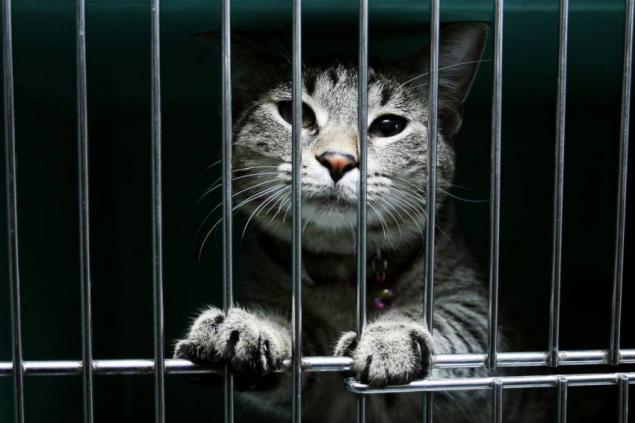
"Miranda rights»
Everyone knows that during the arrest the villains in the American police handcuffing utters the magic words: "You have the right to remain silent. Anything you say can and will be used against you in court. You have the right to an attorney. If you can not pay for a lawyer, he will be provided to you by the state. " I, in any case, no arrests in any Hollywood movie without this phrase I do not remember.
And then our former fellow citizens traveling to the United States, there are arrested by the police, and are surprised when they handcuffing one of the policemen said nothing of the sort.
They have the right - after all, "Miranda warning" should not be read out during the arrest, and before the first interrogation. If during the arrest the police is not going to ask arrested for anything other than establishing his identity and residence, the arrest may be carried out at police dead silence.
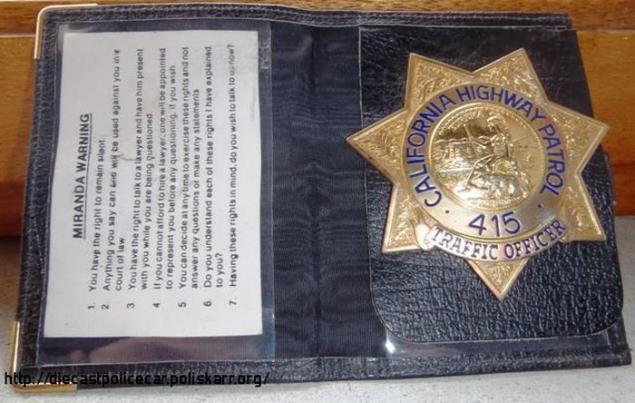
In reading the rules arrested Miranda can not omit any of the requirements or distort it. Many police officers carry a card with printing Miranda rights read to them, and not relying on memory. Sometimes arrested offer to sign the card with the date and time.
In addition, the "Miranda rights" is an exception and does not apply in cases:
1) If the police after his arrest asks the usual questions regarding the identity of the arrested (his name, ID, or nationality).
2) If the question is "undercover cop" (eg podsazhenny the camera to the arrested police officer who poses as a prisoner).
3) If there is a loose concept as "public safety." This exception was, for example, applied in the interrogation of the organizer of the double Boston Marathon bombings Chechen Dzhokhar tsarnaev in 2013, which was questioned a few days without the reading him his rights.
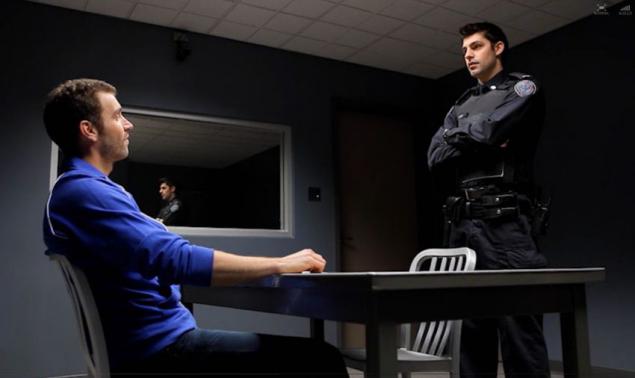
And it should be remembered that this rule applies only after the arrest or detention, ie by limiting freedom of movement. For example, the police stopped the driver can ask him about anything, because in theory this driver is not under arrest. At the same time the driver's refusal to answer questions before his arrest or his "outstanding excitement tacit fidgeting" or samoinkriminiruyuschie recognition could be used against him in court.
Or here's an interesting case. Police summoned a suspect in the robbery and offered to tell all that he knew about the crime, promising that he would freely go home, even if his testimony will carry appreciative character. The US Supreme Court in the case of Oregon (1977). Regarded this questioning as legitimate and do not require familiarity with the rules of Miranda, as the respondent was not in custody.
The phrase is "If you can not pay for a lawyer, he will be provided to you by the State", it means only one thing - if the arrested person is not your personal lawyer, the first date with free (and almost useless) public defender will take only 72 hours in the courtroom where a judge will decide whether to continue detention of the arrested in custody.
"Give me the phone! I'm entitled to one phone call »
"The right to a phone call»
In fact, in the US there is no federal law that would provide the arrested person the right to a phone call. Such laws exist in some US states (eg, the California Penal Code states that "Section 851, 5. (a) (1) Immediately after the arrest, except in cases where it is physically impossible, and no later than three hours after the arrest, the arrested person has the right to make at least three completed telephone call ... "), but California is the exception rather than the rule, and in other states to require a phone call arrested may well say," That's when you get arrested in California, then you will call. "< br /> In most states the police can, how to allow the arrested person to call anywhere and as much as necessary and without explanation, forbid him to make even one phone call, and with his lawyer, if necessary, the police will contact itself.

"Honey, I now linger a little, I do not wait for dinner»
And the mobile phone during the arrest once selected, and to call and if the arrested person is allowed, it is only through a switch. It will inquire where the telephone was arrested wants to call, dial the called number, ask if there willing to talk with such a - such a (and if they agree to pay for the call if it is outside the local calling area). If consent is obtained, then the prisoner is connected to user.
Again in different states differently. For example, in Minnesota who was arrested has the right to a phone call (not on the completion of the call), all phones in the police there are paid - connection costs $ 15, $ 5 minute call If the caller does not answer or refuses to pay the conversation, it is believed that the arrested thereby using their right to a phone call.
And rest assured - when the police arrested allow a telephone conversation, it will be captured and recorded. Everything said during a phone call, it can be used against the detainee, without any warnings that (if it is, of course, not talking arrested with his lawyer).
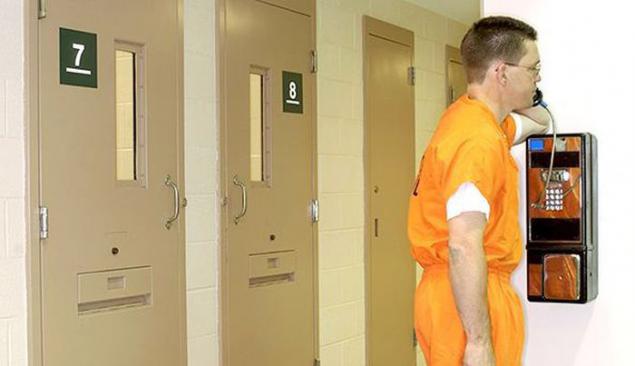
Oddly enough, but the two Hollywood myth had a favorable impact on the legislators of Ukraine and Russia (they too are watching a Hollywood blockbuster). In the fourth part of Article 29 of the Constitution of Ukraine lawmakers stipulates that any person arrested or detained must be informed without delay of the reasons for his arrest or detention, apprised of his rights and this must be reported to the relatives of an arrested or detained.
Part 4 of Art. 208 of the Criminal Procedure Code and Art. 223.1 of the Criminal Procedure Code contain provisions, which to some extent can be considered analogous to "Miranda rights." According to him, the suspect must be notified in writing of the reasons for arrest or detention, he must be apprised of his rights, including the right to counsel and the right to refuse to testify.
Under Russian law, following the adoption of the law "On Police", entered into force on 01 March 2011, the detainees directly spelled out the right to a phone call immediately after the arrest.
Direct right of a detained or arrested person to a phone call in the Ukrainian legislation does not provide, but in accordance with Art. 59 of the Constitution everyone has the right to legal assistance, so refuse to call a lawyer or legal aid center, the police have no right to. Although it may be, of course.
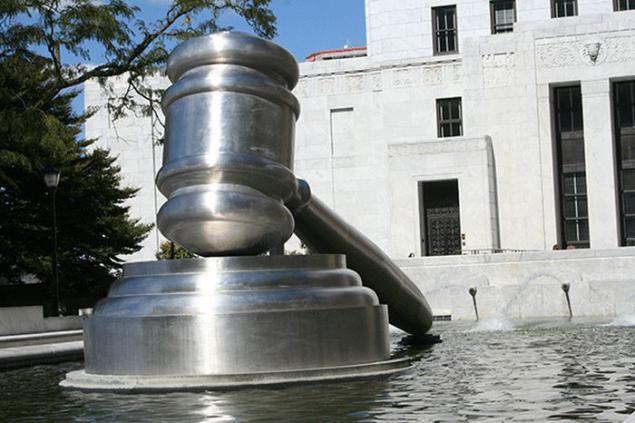
And just in case my phone "scored" two numbers. Hotline of the Ukrainian Embassy in Russia +7 (919) 7687796, and a single telephone number system of free legal assistance upon arrest or detention in Ukraine +3 (800) 213103 with automatic redirection to the nearest territorial center, where the clock can be called free lawyer (Up also free).
I recommend. Sense of this is likely to be small, but the worst is certainly not. For if a person detained or arrested in Russia and Ukraine, where the already worse ...
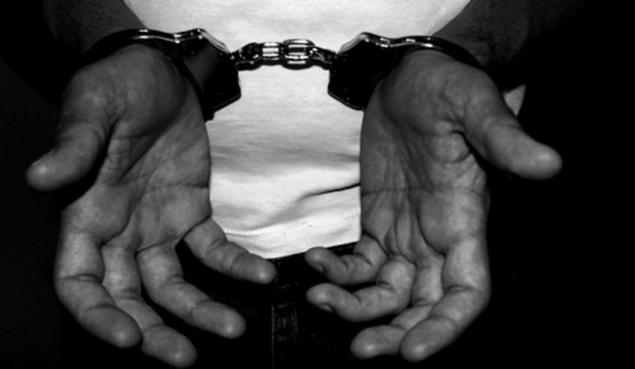
Source: oadam.livejournal.com
In fact, this is not possible and not allowed across America - is that it not only undermines the discipline in the police force, but also a danger in a critical situation when one of the partners will not be able to act like a professional.

Or detective transferred from one of the police department to another in the same rank in the department of homicide. In life, if such transfer or seniority nor the police ranks are not stored - in this case the police again begins with the title of the youngest «officer», and with the lowest job patrolling the streets.
Since the salary of the police depends on its rank (salary of a police sergeant from $ 58 739 to $ 70, 349 a year, while a simple police officer from $ 40 000 to $ 50, 000 per year) and years of service, these transfers are not real. That retirement officers often move to another state (usually California or Florida), and again get a job in the police to obtain besides the salary, a pension from the old police department.

"Miranda rights»
Everyone knows that during the arrest the villains in the American police handcuffing utters the magic words: "You have the right to remain silent. Anything you say can and will be used against you in court. You have the right to an attorney. If you can not pay for a lawyer, he will be provided to you by the state. " I, in any case, no arrests in any Hollywood movie without this phrase I do not remember.
And then our former fellow citizens traveling to the United States, there are arrested by the police, and are surprised when they handcuffing one of the policemen said nothing of the sort.
They have the right - after all, "Miranda warning" should not be read out during the arrest, and before the first interrogation. If during the arrest the police is not going to ask arrested for anything other than establishing his identity and residence, the arrest may be carried out at police dead silence.

In reading the rules arrested Miranda can not omit any of the requirements or distort it. Many police officers carry a card with printing Miranda rights read to them, and not relying on memory. Sometimes arrested offer to sign the card with the date and time.
In addition, the "Miranda rights" is an exception and does not apply in cases:
1) If the police after his arrest asks the usual questions regarding the identity of the arrested (his name, ID, or nationality).
2) If the question is "undercover cop" (eg podsazhenny the camera to the arrested police officer who poses as a prisoner).
3) If there is a loose concept as "public safety." This exception was, for example, applied in the interrogation of the organizer of the double Boston Marathon bombings Chechen Dzhokhar tsarnaev in 2013, which was questioned a few days without the reading him his rights.

And it should be remembered that this rule applies only after the arrest or detention, ie by limiting freedom of movement. For example, the police stopped the driver can ask him about anything, because in theory this driver is not under arrest. At the same time the driver's refusal to answer questions before his arrest or his "outstanding excitement tacit fidgeting" or samoinkriminiruyuschie recognition could be used against him in court.
Or here's an interesting case. Police summoned a suspect in the robbery and offered to tell all that he knew about the crime, promising that he would freely go home, even if his testimony will carry appreciative character. The US Supreme Court in the case of Oregon (1977). Regarded this questioning as legitimate and do not require familiarity with the rules of Miranda, as the respondent was not in custody.
The phrase is "If you can not pay for a lawyer, he will be provided to you by the State", it means only one thing - if the arrested person is not your personal lawyer, the first date with free (and almost useless) public defender will take only 72 hours in the courtroom where a judge will decide whether to continue detention of the arrested in custody.
"Give me the phone! I'm entitled to one phone call »
"The right to a phone call»
In fact, in the US there is no federal law that would provide the arrested person the right to a phone call. Such laws exist in some US states (eg, the California Penal Code states that "Section 851, 5. (a) (1) Immediately after the arrest, except in cases where it is physically impossible, and no later than three hours after the arrest, the arrested person has the right to make at least three completed telephone call ... "), but California is the exception rather than the rule, and in other states to require a phone call arrested may well say," That's when you get arrested in California, then you will call. "< br /> In most states the police can, how to allow the arrested person to call anywhere and as much as necessary and without explanation, forbid him to make even one phone call, and with his lawyer, if necessary, the police will contact itself.

"Honey, I now linger a little, I do not wait for dinner»
And the mobile phone during the arrest once selected, and to call and if the arrested person is allowed, it is only through a switch. It will inquire where the telephone was arrested wants to call, dial the called number, ask if there willing to talk with such a - such a (and if they agree to pay for the call if it is outside the local calling area). If consent is obtained, then the prisoner is connected to user.
Again in different states differently. For example, in Minnesota who was arrested has the right to a phone call (not on the completion of the call), all phones in the police there are paid - connection costs $ 15, $ 5 minute call If the caller does not answer or refuses to pay the conversation, it is believed that the arrested thereby using their right to a phone call.
And rest assured - when the police arrested allow a telephone conversation, it will be captured and recorded. Everything said during a phone call, it can be used against the detainee, without any warnings that (if it is, of course, not talking arrested with his lawyer).

Oddly enough, but the two Hollywood myth had a favorable impact on the legislators of Ukraine and Russia (they too are watching a Hollywood blockbuster). In the fourth part of Article 29 of the Constitution of Ukraine lawmakers stipulates that any person arrested or detained must be informed without delay of the reasons for his arrest or detention, apprised of his rights and this must be reported to the relatives of an arrested or detained.
Part 4 of Art. 208 of the Criminal Procedure Code and Art. 223.1 of the Criminal Procedure Code contain provisions, which to some extent can be considered analogous to "Miranda rights." According to him, the suspect must be notified in writing of the reasons for arrest or detention, he must be apprised of his rights, including the right to counsel and the right to refuse to testify.
Under Russian law, following the adoption of the law "On Police", entered into force on 01 March 2011, the detainees directly spelled out the right to a phone call immediately after the arrest.
Direct right of a detained or arrested person to a phone call in the Ukrainian legislation does not provide, but in accordance with Art. 59 of the Constitution everyone has the right to legal assistance, so refuse to call a lawyer or legal aid center, the police have no right to. Although it may be, of course.

And just in case my phone "scored" two numbers. Hotline of the Ukrainian Embassy in Russia +7 (919) 7687796, and a single telephone number system of free legal assistance upon arrest or detention in Ukraine +3 (800) 213103 with automatic redirection to the nearest territorial center, where the clock can be called free lawyer (Up also free).
I recommend. Sense of this is likely to be small, but the worst is certainly not. For if a person detained or arrested in Russia and Ukraine, where the already worse ...

Source: oadam.livejournal.com






